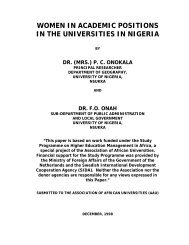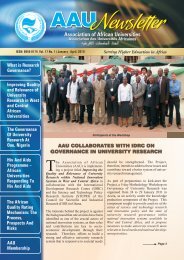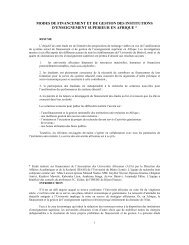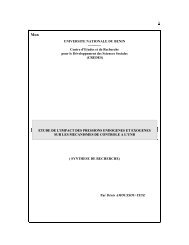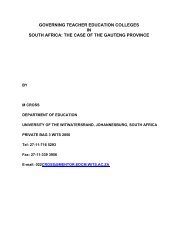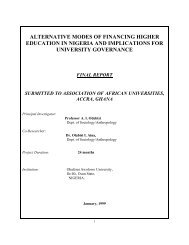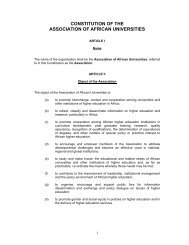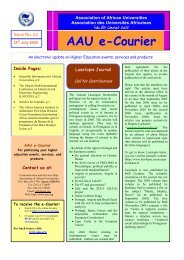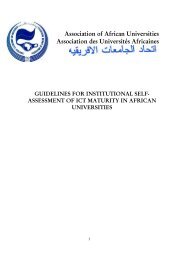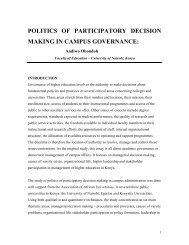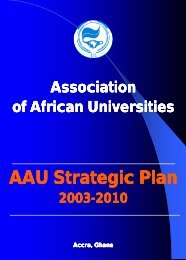undergraduates' attitudes and the study of mathematics at the ...
undergraduates' attitudes and the study of mathematics at the ...
undergraduates' attitudes and the study of mathematics at the ...
- No tags were found...
You also want an ePaper? Increase the reach of your titles
YUMPU automatically turns print PDFs into web optimized ePapers that Google loves.
The findings th<strong>at</strong> girls were frightened <strong>of</strong> m<strong>at</strong>hs than boys (Tobias, 1978) <strong>and</strong> th<strong>at</strong> girls<br />
were unsure <strong>of</strong> <strong>the</strong>ir ma<strong>the</strong>m<strong>at</strong>ical ability (J<strong>of</strong>fe <strong>and</strong> Foxman, 1986) could be a result <strong>of</strong><br />
such influences through neg<strong>at</strong>ive practices in <strong>the</strong> classroom. A number <strong>of</strong> studies have<br />
shown th<strong>at</strong> boys' more interaction with teachers in class than girls tend to influence better<br />
development <strong>of</strong> ma<strong>the</strong>m<strong>at</strong>ical concepts among male students. Also <strong>the</strong> p<strong>at</strong>tern <strong>of</strong><br />
interaction in class tended to make boys appear more competent in m<strong>at</strong>hs than girls<br />
(Jungwirth, 1991). Boys gre<strong>at</strong>er use <strong>of</strong> verbal <strong>and</strong> non-verbal language to domin<strong>at</strong>e more<br />
<strong>of</strong> <strong>the</strong> teacher's time in terms <strong>of</strong> <strong>at</strong>tention <strong>and</strong> classroom control is one <strong>of</strong> <strong>the</strong> influencing<br />
factors favouring boys in class (Skelton, 1993). For example, boys <strong>at</strong>traction to <strong>the</strong><br />
teacher's time could be <strong>at</strong>tained by boys being more mobile than girls in <strong>the</strong> classroom<br />
(Serbin, 1978 <strong>and</strong> Lee, 1990).<br />
The belief to some people th<strong>at</strong> m<strong>at</strong>hs was a male domain Boswell (1985) was not only<br />
held by ordinary people in society e.g. those who were not in <strong>the</strong> field <strong>of</strong> m<strong>at</strong>hs, but also<br />
to m<strong>at</strong>hs teachers <strong>the</strong>mselves. Some m<strong>at</strong>hs teachers had a belief th<strong>at</strong> boys were more<br />
academically capable than girls <strong>and</strong> th<strong>at</strong> boys' m<strong>at</strong>hs contributions were more impressive<br />
(Fennema <strong>at</strong> el 1990 <strong>and</strong> Fennema, 1990). Though some girls' work could be identical to<br />
th<strong>at</strong> <strong>of</strong> boys, boys could still be r<strong>at</strong>ed higher than girls. The sex <strong>of</strong> <strong>the</strong> teacher could also<br />
be an influencing factor where for example <strong>the</strong> assessment <strong>of</strong> boys by a female teacher<br />
could produce a generous mark, whilst <strong>the</strong> most severe marking <strong>of</strong> girls' work by a male<br />
teacher (Goddar-Spear, 1989).<br />
As some studies have shown, girls in co-educ<strong>at</strong>ion schools had some neg<strong>at</strong>ive <strong>at</strong>titude<br />
7



